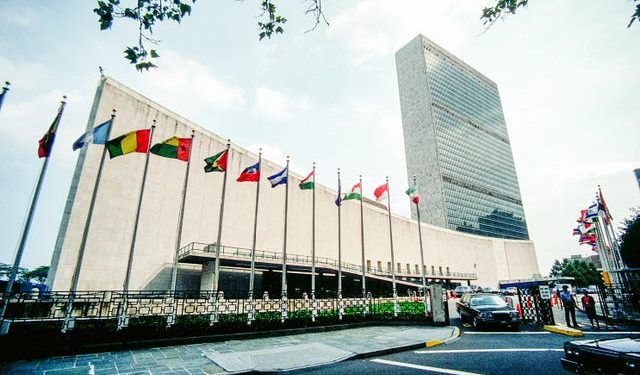United Nations: India has called out Pakistan for co-sponsoring a UN resolution on culture of peace while rights of minorities are ‘emasculated’ in the country. India has said Pakistani law enforcement agencies stood as ‘mute spectators’ when a historic Hindu temple was attacked and set on fire by a mob.
In December, a mob led by some local clerics and members of radical Islamist party Jamiat Ulema-e-Islam vandalised the Hindu temple and set it on fire in Terri village in Khyber Pakhtunkhwa’s Karak district.
The attack drew strong condemnation from human rights activists and the minority Hindu community leaders. It prompted Pakistan’s Supreme Court to order its reconstruction.
“It is a matter of great irony that the country where the most recent attack and demolition of a Hindu temple took place in a series of such attacks and where the rights of minorities are being emasculated is one of the co-sponsors of the resolution under the agenda item ‘Culture of Peace’,” India said in a statement Thursday.
“The resolution cannot be a smokescreen for countries like Pakistan to hide behind,” India added in its statement on adoption of resolution on ‘Promoting a culture of peace and tolerance to safeguard religious sites’.
The UN General Assembly adopted Thursday the resolution that condemned all acts or threats of violence, destruction, damage or endangerment, directed against religious sites as such, that continue to occur in the world, and denounced any moves to obliterate or forcibly convert any religious sites. The resolution was co-sponsored by Pakistan along with 21 other nations.
India, in the explanation of position on the resolution, cited attacks on the Hindu temple in the Pakistani town of Karak, against a Sikh Gurudwara as well as the destruction of the Bamyan Buddha in Afghanistan and said in the world of growing terrorism, violent extremism, radicalisation and intolerance, religious sites and cultural heritage sites remain vulnerable to terrorist acts, violence and destruction.
“The images of the shattering of the iconic Bamyan Buddha by fundamentalists are still vivid in our memories. The terrorist bombing of the Sikh gurdwara in Afghanistan where 25 Sikh worshipers were killed is yet another example of this vulnerability. Most recently, in December 2020, a historic Hindu temple was attacked and set on fire by a mob in the town of Karak in Pakistan with explicit support and connivance with the law enforcement agencies which, stood as mute spectators while the historic temple was being razed,” India said in the statement.
India reiterated its call for the application of the principles of objectivity, non-selectivity and impartiality to form the basis of discussions in the United Nations especially on the issue of religion.
India told the General Assembly that it has strong legal framework for acts of violence or discrimination based on religion including violence targeted towards the places of worship.






































